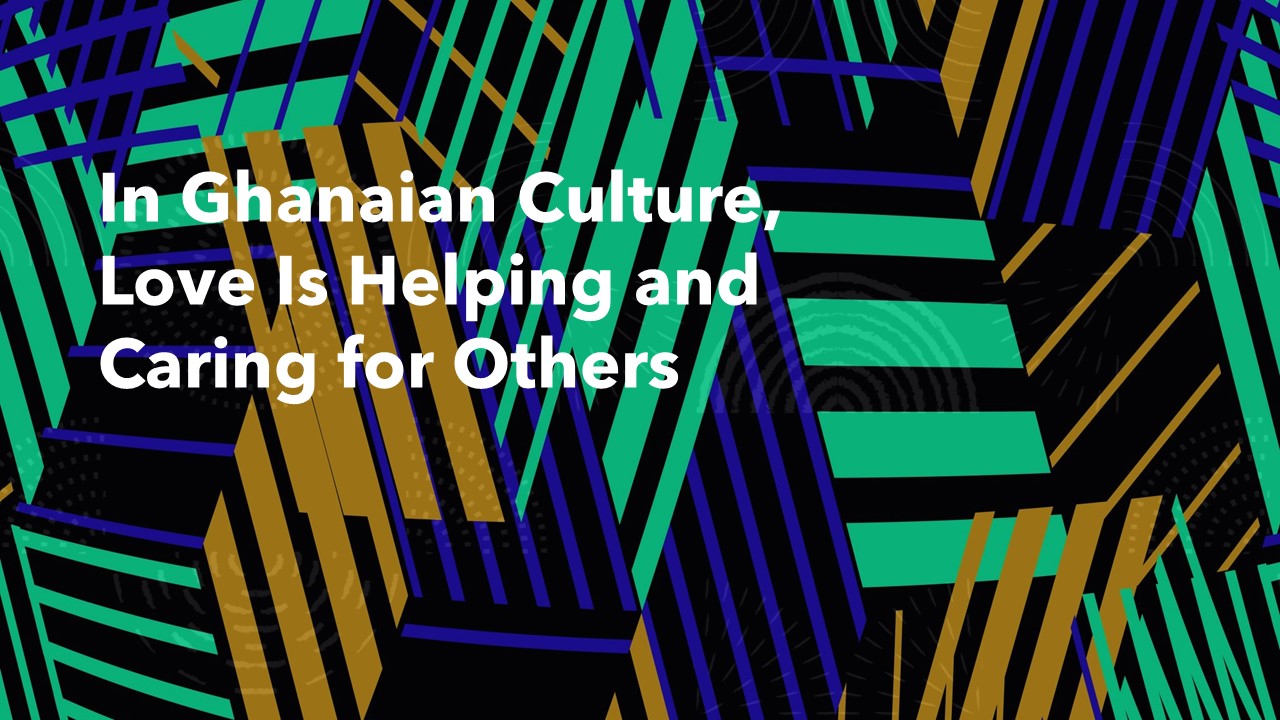Many studies have shown that despite cross-cultural similarities, cultural conceptions of love vary across societies (see, for review, Karandashev, 2019; 2022). Culture influences how individuals experience and express love, as well as social norms prevalent among communities (Fiske & Taylor, 2013; Kaufmann, 2011).
For instance, individualistic cultures tend to value experience and expression of passionate love more, while collective cultures tend to value the experience and expression of companionate love more (Fiske & Taylor, 2013). Passionate love focuses on how love makes one feel, while companionate love focuses on feelings for and caring for others.
Love in the Cultures of Sub-Saharan Africa
In the collectivist societies of Sub-Saharan Africa, cultural norms associate love with experiences and expressions of affect towards others, social relationships, and material provisioning (Coe, 2011; Cornwall, 2002).
Love entails a commitment to sharing and reciprocity in social relationships, as well as the supply and allocation of material resources (Keefe, 2016). These qualities of love expression were referred to by researchers as “real love” (van Eerdewijk, 2006) and “materiality of care” (Coe, 2011).
Interdependent Life and Love in Ghanaian Communities
Ghana, a country in West Africa, presents an example of this conceptualization of love in its culture. A Ghanaian understanding of love entails meeting the needs of close others.
What are the origins of these cultural beliefs?
The majority of Ghanaians express their sense of identity through duty-based interpersonal interactions. Individuals are born into close-knit families that place a strong emphasis on socially required interpersonal responsibilities. Ghanaians care about preserving their interdependence in relationships and regard themselves as interdependent (Markus & Kitayama, 1991).
The allocation of resources is the fundamental basis of our daily existence. The extended family structure has historically provided support and care for both young people and the elderly. People must reciprocate obligations, duties, and responsibilities toward family members for this system of care to function effectively. Ghanaians show this facet of love through diverse social actions and interactions. Material expressions of love are valued in Ghana, sometimes, above emotional expressions of love (Coe, 2011).
The Impact of Christian Beliefs on Ghanaians’ Understanding of Love
Religious beliefs influence the notion of love among people of faith. They express their best human qualities based on the universal ethos of honesty, care, and brotherhood (Prince, Denis, & van Dijk, 2009).
Christianity is a major part of Ghana’s culture and has an impact on many people’s daily lives. How do Christian beliefs influence Ghanaian cultural understandings of love?
Christians make a distinction between eros love and agape love. A desire for something or someone drives eros love, whereas respect for and concern for others drives agape love. The eros type of love is self-oriented, focusing on benefits to the self, while the agape type of love is other-oriented, emphasizing benefits to the other person. Ghanaian Christian churches influence Ghanaian society’s conceptions of love by promoting love in relationships and family life.
What Did a Recent Study on Love in Ghana Show?
Researchers looked into how Christian Ghanaians view love in relation to family in a recent study on love in the West African nation of Ghana. Let’s look at some of the main themes that 61 participants—men and women aged 20 to 70—reported when anthropologists interviewed them (Osei-Tutu et al., 2018).
In a previous blog post on this site, I explained how Ghanaians express and fulfill their love by attending to the needs of those close to them.
Helping Others Who Are in Need
Among those others, informants mentioned friends, strangers, and elderly people. Many participants (70%) regarded love as providing help to individuals in need, including the elderly, friends, and even complete strangers. For example, participants stated:
… if you go out and you see an elderly person who is not even from your own family, if there is anything to assist them with, you help them. If you have the means to support them, you do as much as you can.
(51-year-old female)
Supposing a friend is having a problem, losing a loved one or in need of some money, you take care of it or give her something.
(37-year-old male)
If you think somebody needs your help and you have the means, either you know the person or don’t know the person, you should show the person love… either in kind, in physical terms.
(34-year-old male)
As one can see, the Ghanaian Christian participants expressed their beliefs about agape love in their responses. They considered acts of love, such as fulfilling familial and neighborly responsibilities, to be the most important expressions of love. This aligns with Christian principles that prioritize compassion and the well-being of both one’s own family and others.
Love Is Care
Many Christian Ghanaian respondents (48%) in the study viewed love primarily as caring actions towards others, such as “showing concern.” Participants shared the following examples and provided comments:
…in school I’ve made a lot of friends… sometimes when you’re not well, they call…. When you’re on holidays, this long vac [vacation], they’ll be calling and checking on… So that’s love.
(21-year-old female)
…when you are sick they [people] visit you in the house, when you are promoted they show appreciation they congratulate you; it’s a way of showing love.
(40-year-old female)
Other Expressions of Love Among Ghanaians
Several participants (10%) mentioned kissing (children), hugging (children and husband), and touching (husband). Furthermore, a small percentage (7%) claimed that love entails openness, transparency, and not keeping secrets. Only a few participants mentioned these, so the authors did not assign them to a specific theme.
Love as Agape in Ghanaian Christian Culture
It is worth noting that these Ghanaian Christian participants made few references to eros (a type of passionate love) and instead emphasized agape (kind and caring actions toward others). They described love from a Judeo-Christian perspective, as illustrated by biblical examples. These definitions of love go beyond close relationships and intersect with the definition of what a good Christian or person should be.
